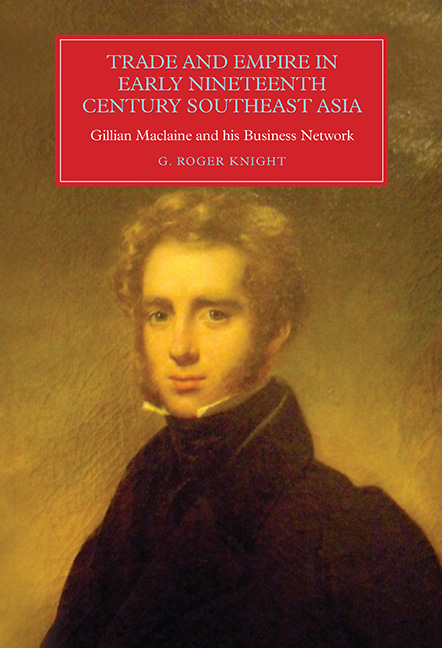 Trade and Empire in Early Nineteenth-Century Southeast Asia
Trade and Empire in Early Nineteenth-Century Southeast Asia Book contents
- Frontmatter
- Contents
- Acknowledgements
- Abbreviations
- Map of Maritime Asia: Trade and Empire, c. 1830
- Preface
- Map of South Central Java, c. 1830
- 1 Introduction: A Scots Émigré, Imperial Systems and Global Commodities
- 2 Maclaine’s ‘Apprenticeship’: The City of London and the Cotton Trade with Asia, 1816–20
- 3 A ‘Scotch Adventurer’: Batavia, Coffee and Colonial Wars, 1820–27
- 4 The Pivotal Years: ‘Maclaine Watson’, Treacherous Chains, Sickness and Debt, 1827–32
- 5 The Network Takes Shape: Connections, Business and Associates, 1832–40
- 6 Conclusion: Maclaine’s Legacy, Commodities and Trade on a Colonial ‘Periphery’, 1840–1964
- Bibliography
- Index
- Worlds of the East India Company
6 - Conclusion: Maclaine’s Legacy, Commodities and Trade on a Colonial ‘Periphery’, 1840–1964
Published online by Cambridge University Press: 17 June 2021
- Frontmatter
- Contents
- Acknowledgements
- Abbreviations
- Map of Maritime Asia: Trade and Empire, c. 1830
- Preface
- Map of South Central Java, c. 1830
- 1 Introduction: A Scots Émigré, Imperial Systems and Global Commodities
- 2 Maclaine’s ‘Apprenticeship’: The City of London and the Cotton Trade with Asia, 1816–20
- 3 A ‘Scotch Adventurer’: Batavia, Coffee and Colonial Wars, 1820–27
- 4 The Pivotal Years: ‘Maclaine Watson’, Treacherous Chains, Sickness and Debt, 1827–32
- 5 The Network Takes Shape: Connections, Business and Associates, 1832–40
- 6 Conclusion: Maclaine’s Legacy, Commodities and Trade on a Colonial ‘Periphery’, 1840–1964
- Bibliography
- Index
- Worlds of the East India Company
Summary
The commercial network that Gillian Maclaine established in Southeast Asia was part of what has been identified as an ‘… expatriate maritime business community that was deeply embedded in … imperial territories’. Nonetheless, the commodity chains – coffee, cotton goods and (most probably) opium – in which Maclaine Watson was enmeshed were global as well as imperial in character, and the dynamics that drove their commercial (and plantation) ventures had at least as much to with world markets as with ‘empire’ per se. At same time, moreover, the Maclaine Watson network remained a partnership of family businesses whose structure set it apart from a dominant contemporary trend (if such indeed it was) toward the evolution of the ‘visible hand’ of a centralised, formal hierarchy of impersonal control and management. One closely associated characteristic was that the network likewise remained outside the web of metropolitan control and direction that, classically, constituted a hallmark of late-era imperialism. Instead, the network's continued existence for well over a century after its founder's death not only demonstrates the vitality and relative autonomy of developments on the so-called ‘colonial periphery’. It also underscores, while complicating somewhat, a variety of ongoing analyses of the long-term significance of the intra-Asian mercantile activity (as distinct from bilateral, inter-continental trade between Asia and ‘the West’) in which the network was predominantly engaged. On these several counts, it can be argued that Gillian Maclaine left behind him a quite singular enterprise.
A Network of Family Firms and the Scots’ Diaspora
Gillian Maclaine became the co-founder of Maclaine Watson in Batavia in 1827, when the new firm supplanted the earlier business of Gillian Maclaine & Co., in which he had been partner with associates in London and Calcutta. The new firm had no such ties, but was closely linked in Southeast Asia with two other firms in Java and one in Singapore, all three of which Maclaine had played some part in establishing. The resultant Maclaine Watson ‘network’ – in Batavia Maclaine Watson itself, McNeill & Co. in Semarang, Fraser Eaton in Surabaya and Maclaine Fraser in Singapore – functioned throughout is existence as a network of mercantile firms with interlocking memberships but with no obvious ‘head office’. To a remarkable degree, it remained a partnership of family businesses in which many but by no means all the partners came from inter-related Scots families.
- Type
- Chapter
- Information
- Trade and Empire in Early Nineteenth-Century Southeast AsiaGillian Maclaine and his Business Network, pp. 153 - 174Publisher: Boydell & BrewerPrint publication year: 2015
